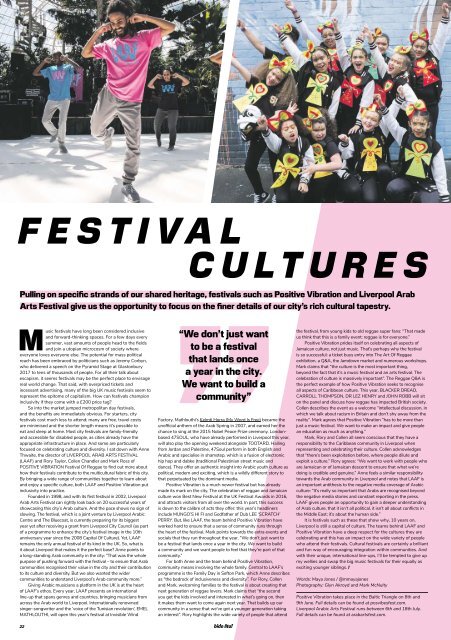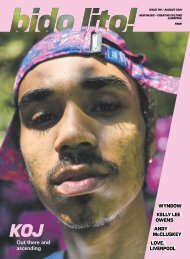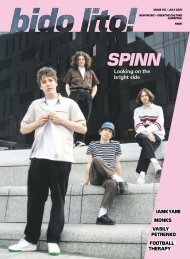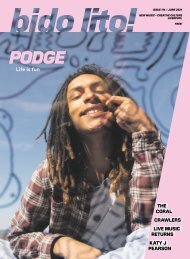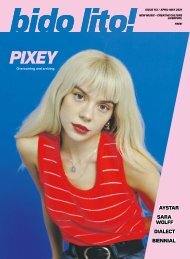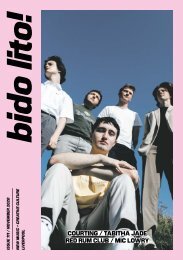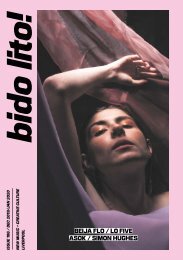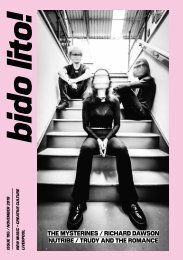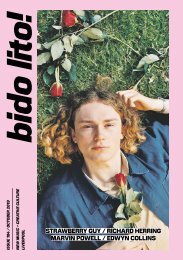Issue 89 / June 2018
June 2018 issue of Bido Lito! magazine. Featuring: ART OF FOOTBALL, BEACH SKULLS, BONNACONS OF DOOM, LAAF and POSITIVE VIBRATION, ALEX CAMERON, TRACKY, SOUND CITY 2018 REVIEW and much more.
June 2018 issue of Bido Lito! magazine. Featuring: ART OF FOOTBALL, BEACH SKULLS, BONNACONS OF DOOM, LAAF and POSITIVE VIBRATION, ALEX CAMERON, TRACKY, SOUND CITY 2018 REVIEW and much more.
You also want an ePaper? Increase the reach of your titles
YUMPU automatically turns print PDFs into web optimized ePapers that Google loves.
FESTIVAL<br />
CULTURES<br />
Pulling on specific strands of our shared heritage, festivals such as Positive Vibration and Liverpool Arab<br />
Arts Festival give us the opportunity to focus on the finer details of our city’s rich cultural tapestry.<br />
Music festivals have long been considered inclusive<br />
and forward-thinking spaces. For a few days every<br />
summer, vast amounts of people head to the fields<br />
and join a utopian microcosm of society where<br />
everyone loves everyone else. The potential for mass political<br />
reach has been embraced by politicians such as Jeremy Corbyn,<br />
who delivered a speech on the Pyramid Stage at Glastonbury<br />
2017 to tens of thousands of people. For all their talk about<br />
escapism, it seems festivals may be the perfect place to envisage<br />
real world change. That said, with overpriced tickets and<br />
incessant advertising, many of the big UK music festivals seem to<br />
represent the epitome of capitalism. How can festivals champion<br />
inclusivity if they come with a £200 price tag?<br />
So into the market jumped metropolitan day festivals,<br />
and the benefits are immediately obvious. For starters, city<br />
festivals cost much less to attend; many are free, travel costs<br />
are minimised and the shorter length means it’s possible to<br />
eat and sleep at home. Most city festivals are family-friendly<br />
and accessible for disabled people, as cities already have the<br />
appropriate infrastructure in place. And some are particularly<br />
focused on celebrating culture and diversity. I sat down with Anne<br />
Thwaite, the director of LIVERPOOL ARAB ARTS FESTIVAL<br />
(LAAF) and Rory Taylor, Collen Chandler and Mark Ross of<br />
POSITIVE VIBRATION Festival Of Reggae to find out more about<br />
how their festivals contribute to the multicultural fabric of this city.<br />
By bringing a wide range of communities together to learn about<br />
and enjoy a specific culture, both LAAF and Positive Vibration put<br />
inclusivity into practice.<br />
Founded in 1998, and with its first festival in 2002, Liverpool<br />
Arab Arts Festival can rightly look back on 20 successful years of<br />
showcasing this city’s Arab culture. And the pace shows no sign of<br />
slowing. The festival, which is a joint venture by Liverpool Arabic<br />
Centre and The Bluecoat, is currently preparing for its biggest<br />
year yet after receiving a grant from Liverpool City Council (as part<br />
of a programme to enhance the city’s festival image in the 10th<br />
anniversary year since the 2008 Capital Of Culture). Yet, LAAF<br />
remains the only annual festival of its kind in the UK. So, what is<br />
it about Liverpool that makes it the perfect base? Anne points to<br />
a long-standing Arab community in the city: “That was the whole<br />
purpose of pushing forward with the festival – to ensure that Arab<br />
communities recognised their value in the city and their contribution<br />
to its culture and diversity. But we also wanted the wider<br />
communities to understand Liverpool’s Arab community more.”<br />
Giving Arabic musicians a platform in the UK is at the heart<br />
of LAAF’s ethos. Every year, LAAF presents an international<br />
line-up that spans genres and countries, bringing musicians from<br />
across the Arab world to Liverpool. Internationally renowned<br />
singer-songwriter and the ‘voice of the Tunisian revolution’, EMEL<br />
MATHLOUTHI, will open this year’s festival at Invisible Wind<br />
“We don’t just want<br />
to be a festival<br />
that lands once<br />
a year in the city.<br />
We want to build a<br />
community”<br />
Factory. Mathlouthi’s Kelmti Horra (My Word Is Free) became the<br />
unofficial anthem of the Arab Spring in 2007, and earned her the<br />
chance to sing at the 2015 Nobel Peace Prize ceremony. Londonbased<br />
47SOUL, who have already performed in Liverpool this year,<br />
will also play the opening weekend alongside TOOTARD. Hailing<br />
from Jordan and Palestine, 47Soul perform in both English and<br />
Arabic and specialise in shamstep, which is a fusion of electronic<br />
hip hop and dabke (traditional Palestinian street music and<br />
dance). They offer an authentic insight into Arabic youth culture as<br />
political, modern and exciting, which is a wildly different story to<br />
that perpetuated by the dominant media.<br />
Positive Vibration is a much newer festival but has already<br />
made its mark on the city. The celebration of reggae and Jamaican<br />
culture won Best New Festival at the UK Festival Awards in 2016,<br />
and attracts visitors from all over the world. In part, this success<br />
is down to the calibre of acts they offer: this year’s headliners<br />
include MUNGO’S HI FI and Godfather of Dub LEE ‘SCRATCH’<br />
PERRY. But, like LAAF, the team behind Positive Vibration have<br />
worked hard to ensure that a sense of community runs through<br />
the heart of the festival. Mark points towards the extra events and<br />
socials that they run throughout the year. “We don’t just want to<br />
be a festival that lands once a year in the city. We want to build<br />
a community and we want people to feel that they’re part of that<br />
community.”<br />
For both Anne and the team behind Positive Vibration,<br />
community means involving the whole family. Central to LAAF’s<br />
programme is the Family Day in Sefton Park, which Anne describes<br />
as “the bedrock of inclusiveness and diversity”. For Rory, Collen<br />
and Mark, welcoming families to the festival is about creating that<br />
next generation of reggae lovers. Mark claims that “the second<br />
you get the kids involved and interested in what’s going on, then<br />
it makes them want to come again next year. That builds up our<br />
community in a sense that we’ve got a younger generation taking<br />
an interest”. Rory highlights the wide variety of people that attend<br />
the festival, from young kids to old reggae super fans: “That made<br />
us think that this is a family event: reggae is for everyone.”<br />
Positive Vibration prides itself on celebrating all aspects of<br />
Jamaican culture, not just music. That’s perhaps why the festival<br />
is so successful: a ticket buys entry into The Art Of Reggae<br />
exhibition, a Q&A, the Jamdown market and numerous workshops.<br />
Mark claims that “the culture is the most important thing,<br />
beyond the fact that it’s a music festival and an arts festival. The<br />
celebration of culture is massively important”. The Reggae Q&A is<br />
the perfect example of how Positive Vibration seeks to recognise<br />
all aspects of Caribbean culture. This year, BLACKER DREAD,<br />
CARROLL THOMPSON, DR LEZ HENRY and JOHN ROBB will sit<br />
on the panel and discuss how reggae has impacted British society.<br />
Collen describes the event as a welcome “intellectual discussion, in<br />
which we talk about racism in Britain and don’t shy away from the<br />
reality”. Mark agrees that Positive Vibration “has to be more than<br />
just a music festival. We want to make an impact and give people<br />
an education as much as anything.”<br />
Mark, Rory and Collen all seem conscious that they have a<br />
responsibility to the Caribbean community in Liverpool when<br />
representing and celebrating their culture. Collen acknowledges<br />
that “there’s been exploitation before, where people dilute and<br />
exploit a culture.” Rory agrees: “We want to work with people who<br />
are Jamaican or of Jamaican descent to ensure that what we’re<br />
doing is credible and genuine.” Anne feels a similar responsibility<br />
towards the Arab community in Liverpool and notes that LAAF is<br />
an important antithesis to the negative media coverage of Arabic<br />
culture: “It’s really so important that Arabs are recognised beyond<br />
the negative media stories and constant reporting in the press.<br />
LAAF gives people an opportunity to gain a deeper understanding<br />
of Arab culture, that it isn’t all political, it isn’t all about conflicts in<br />
the Middle East; it’s about the human side.”<br />
It is festivals such as these that show why, 10 years on,<br />
Liverpool is still a capital of culture. The teams behind LAAF and<br />
Positive Vibration have a deep respect for the cultures they are<br />
celebrating and this has an impact on the wide variety of people<br />
who attend their festivals. Cultural festivals are certainly a brilliant<br />
and fun way of encouraging integration within communities. And<br />
with their unique, international line-ups, I’ll be tempted to give up<br />
my wellies and swap the big music festivals for their equally as<br />
exciting younger siblings. !<br />
Words: Maya Jones / @mmayajones<br />
Photography: Glyn Akroyd and Mark McNulty<br />
Positive Vibration takes place in the Baltic Triangle on 8th and<br />
9th <strong>June</strong>. Full details can be found at posvibesfest.com.<br />
Liverpool Arabic Arts Festival runs between 6th and 18th July.<br />
Full details can be found at arabartsfest.com.<br />
22


